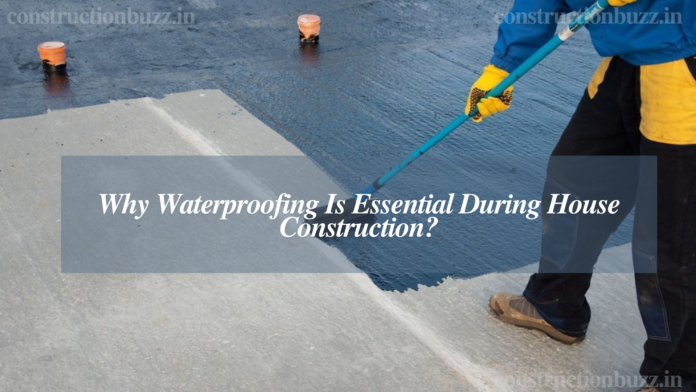Waterproofing is often overlooked in the construction process, yet it plays a crucial role in ensuring the longevity and integrity of a home. This article delves into the significance of waterproofing during house construction, highlighting its benefits and methods, while addressing common concerns and questions.
The Importance of Waterproofing

1. Prevents Structural Damage
Water infiltration can lead to severe structural issues over time. When water seeps into foundations, walls, or roofs, it can weaken these critical components, leading to cracks and eventual collapse. Waterproofing acts as a protective barrier, safeguarding your investment from costly repairs and ensuring the structural integrity of your home.
2. Promotes Healthy Indoor Environments
Moisture buildup can create an ideal environment for mold and mildew growth, which poses serious health risks to occupants. Proper waterproofing prevents moisture from accumulating inside walls and ceilings, thereby promoting better indoor air quality and reducing health hazards associated with mold exposure.
3. Enhances Energy Efficiency
Water infiltration can compromise insulation properties, leading to increased energy consumption for heating and cooling. By keeping moisture out, waterproofing helps maintain energy efficiency in a home, ultimately reducing utility bills and contributing to a more sustainable living environment.
4. Preserves Aesthetic Appeal
Water damage can mar the appearance of a home, leading to unsightly stains, peeling paint, and damaged furnishings. Effective waterproofing preserves the aesthetic appeal of your property by preventing water-related damage that necessitates costly repairs or renovations.
5. Increases Property Value
A well-waterproofed home is more attractive to potential buyers. By investing in waterproofing during construction, homeowners can ensure their property remains damage-free and visually appealing over time, thereby maintaining or even increasing its market value.
Types of Waterproofing Solutions

Understanding the various waterproofing methods available is essential for effective implementation:
- Membranes: These are sheet-like barriers applied to foundation walls or below slabs to prevent water infiltration.
- Coatings: Liquid-applied coatings create a waterproof barrier on surfaces like concrete or masonry.
- Drainage Systems: These systems collect and redirect water away from the foundation, often used in conjunction with sump pumps for basements.
The Role of Professionals

Consulting with qualified professionals is crucial for effective waterproofing. They can assess specific site conditions and recommend appropriate solutions based on building codes and best practices. Proper installation ensures that waterproofing measures are effective and long-lasting.
Also Read : Flat Roof Waterproofing: Essential Tips For Long-lasting Protection
Conclusion
Waterproofing is not merely an option; it is an essential aspect of house construction that protects investments, ensures structural integrity, promotes healthy living environments, enhances energy efficiency, and preserves aesthetic appeal. By understanding the importance of waterproofing and employing the right methods during construction, homeowners can safeguard their properties against water-related issues for years to come.
FAQs
1. What are the main benefits of waterproofing during construction?
Waterproofing prevents structural damage, promotes healthy indoor environments, enhances energy efficiency, preserves aesthetics, and increases property value.
2. How does waterproofing affect indoor air quality?
Effective waterproofing prevents moisture buildup that can lead to mold growth, thereby improving indoor air quality.
3. What types of waterproofing solutions are available?
Common solutions include membranes, coatings, and drainage systems designed to keep water out of buildings.
4. Why should I hire professionals for waterproofing?
Professionals ensure proper assessment of site conditions and installation of effective waterproofing measures according to building codes.
5. Can I waterproof my home myself?
While DIY options exist, hiring professionals is recommended for effective long-term results.
6.What is waterproofing in house construction?
Waterproofing in house construction involves applying protective materials or coatings to surfaces like walls, roofs, and foundations to prevent water penetration and damage.
7. Why is waterproofing important during construction?
Waterproofing is crucial to protect the structure from water damage, mold growth, cracks, and long-term deterioration, ensuring durability and safety.


